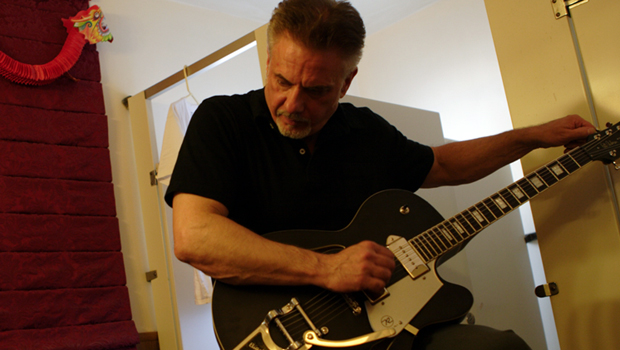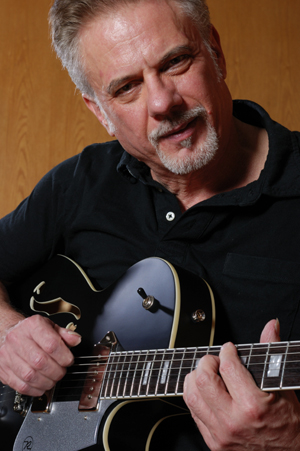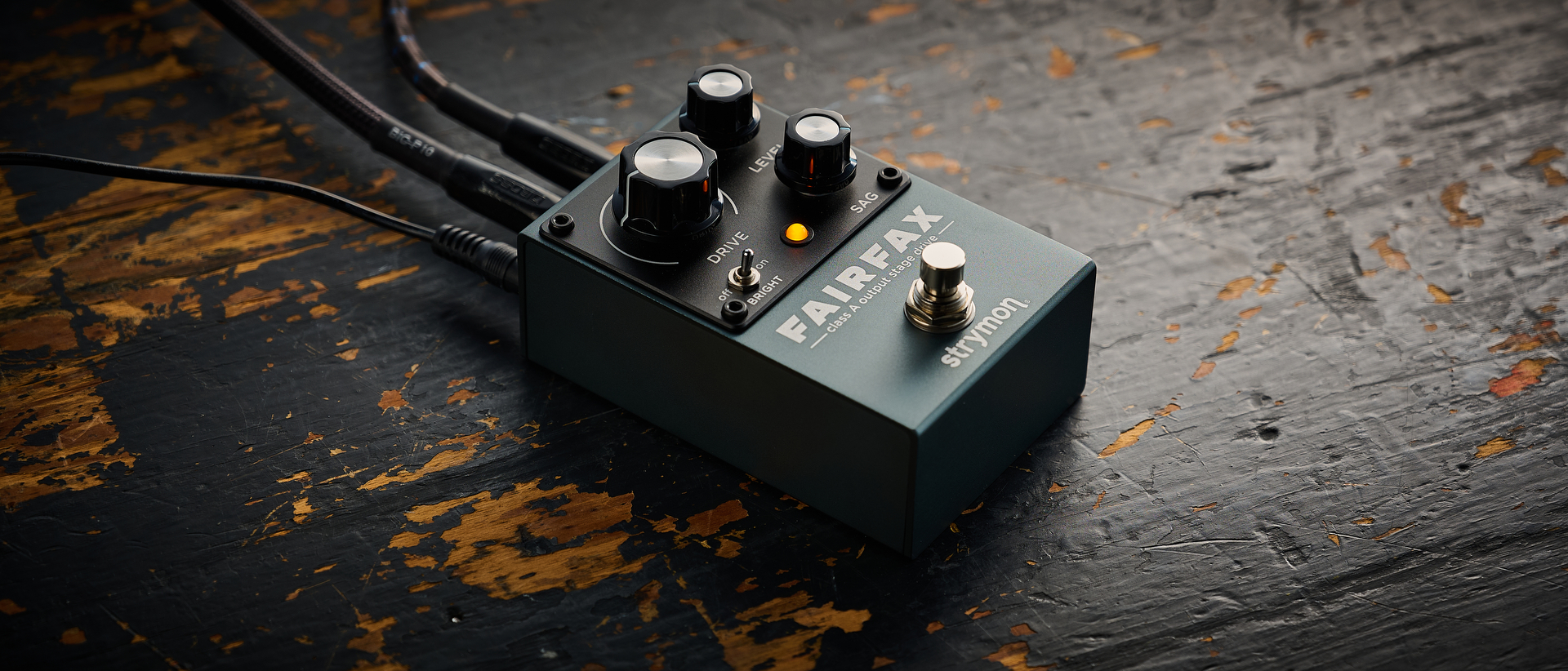Interview: Guitarist Pete Anderson Discusses His Next Album and Life as a Solo Artist
All the latest guitar news, interviews, lessons, reviews, deals and more, direct to your inbox!
You are now subscribed
Your newsletter sign-up was successful

Growing up in Detroit, Michigan, guitarist Pete Anderson began his foray into the music world at age 8 with a lap steel guitar, but his epiphany took place as a teenager.
"Bob Dylan came out, and that was a whole new weird thing that got psychedelic and re-attracted me to the guitar," he says. "So at 16 or 17, I went a completely different route and, through Dylan, went in reverse to the old blues guys like Robert Johnson and Lightnin’ Hopkins. In my late teens and early 20s, I couldn’t get enough of the blues."
His musical journey eventually brought him to Los Angeles, where he launched an almost-20-year working relationship with country artist Dwight Yoakam.
Anderson stepped out on his own 10 years ago and launched his own record label, Little Dog Records. He has signed and produced other artists, in addition to focusing on his own material. Last year, he revisted his blues and jazz roots on his acclaimed album Even Things Up.
Anderson is in the process of writing and recording a new album. He took some time to overview the making of Even Things Up, discuss his upcoming project and look back on some highlights of his remarkable career.
GUITAR WORLD: What is going on in the world of Pete Anderson? There’s a new album in the works.
I stopped playing with Dwight in 2002 and I had a guy on my label named Luke Davis. I made a record with him and sort of shepherded his career for about four years. We went around the world, to Europe and Japan twice, then that fell apart, and I said, “I just want to play my guitar in front of people and I don’t want to be in a situation where anyone can stop me from doing it,” i.e., a singer who doesn’t want to tour, or has to take time off, or wants more money, or any number of things that could keep me from playing.
All the latest guitar news, interviews, lessons, reviews, deals and more, direct to your inbox!
I decided to put my own thing together, really put my nose to the grindstone, and that’s how Even Things Up came about. We’ve toured on it and it has served its purpose, so I’m in the middle of doing the second record in a series of stuff that I’m super-focused on right now.
I’m on a career path for myself. I’m dedicated more to working my career as a guitarist, which I’ve never done. I’ve been a producer who plays guitar, and I want to change the paradigm to be a guitar player who produces records. If and when the time arises and I can work it into my schedule, I can produce, but my main focus is on playing guitar now, so we’re working on the second record.
How is it coming along?
I’ve got half the tracks cut and the other half are written. I’m just deciding little things about tempos, keys, grooves, arranging. It’s really what I’ve done for other people for many years as a producer and arranger, and now I’m doing it for myself, so if I can get a little bit out of body when I work on them, then I can approach it like I’ve done it for other people.
I have my own studio, Dogbone Studios in Burbank, and a real comfortable group of people. Tony Rambo is the engineer, Michael Murphy is producing it again, my wife, Sally Browder, is also a producer and engineer, and she’ll be working on it. It’s pretty much an extension of the same group of people. I’m hoping to bring in a few guests that I didn’t do on the first record, although I did a special edition of the first record and had Bekka Bramlett sing on “Still In Love.” The song went to No. 2 on B.B. King’s Bluesville radio chart, which is the only 24-hour blues station in the world.
We got a lot of airplay and it was nominated by BluesWax magazine as a Top 5 Blues Song of the Year, so it got us some notoriety. My plans are pretty much the same. I’ve worked with these people for many years, so it’s a comfortable environment.
I’m extremely proud of Even Things Up. I set a pretty high bar for myself production-wise and material-wise, and I feel strongly about the material. Hopefully we will match it and probably exceed it, because that record I wasn’t playing in a band or in this situation. It was, “I’m going to do this now.” I started the project from scratch, wrote the songs, recorded the songs, then played the songs live, created an act and got my legs under me as a frontperson.

I’ve been doing that for a couple of years, so I think it will have more of a band feel. I’ve been working with an extraordinary drummer named Jesper Christensen. He’s been playing on some of the tracks, and that’s really changed it because he’s played so many songs.
Half of the record we’ve been doing on the road, and when you do it as a band it takes on a little different character because you have a person on his instrument bringing something to the party. Especially over a period of time, being able to play the songs where he gets to know them, we construct them and then deconstruct them. We know where everything belongs, but we don’t have to state them, and that’s when the real fun happens in music.
Working on your own projects has allowed you to step outside of the parameters you were associated with. How important is it for musicians to step outside of that zone? It is now possible to listen to a radio station that only programs the genre or artist you like. Musicians sometimes don’t want to listen to a genre they have no interest in, and thanks to these stations, they no longer have to do so.
It’s gigantic. If you want to increase your vocabulary as a player, you’ve got to make it part of your life study to hear everyone that’s articulated something on their instrument, because you want to know what they’re thinking and how they think about it. I think it’s part of being a musician. It’s part of the word and you need to explore it.
If I was playing country music, it didn’t mean I didn’t listen to King Curtis or Junior Walker or Albert King or anybody that said, “Check out this new trumpet player, Chet Baker,” or a record I found or Arturo Sandoval or a percussionist, Mongo Santamaria.
You’re going to pick up something from some of these guys, especially the ones who have become masters of their instruments. You’ll find genres and styles that you like and don’t like, but you’ve got to explore it to find that out. The one thing people said to me more than any other about my career with Dwight is, “I never really liked country music, but man, when I heard Dwight Yoakam and I heard your guitar, I started listening to it and there’s some stuff I like.”
There’s a perfect example of if you had just said, “It’s country, I don’t like it,” you would have missed that whole world. I think it’s mandatory. I think you should be very inquisitive as a musician. Even today, if I hear of a new band or a new guitar player, I read about it and I’ll search it immediately — what’s this about, is there something new, a new spin somebody’s putting on something? That’s exciting to me. It’s expanding your vocabulary.
What were the most valuable lessons you learned, as a musician and a producer, while working with Dwight Yoakam, and how did those years prepare you when it came time to start your own label?
That’s a whole book! I was with Dwight from 1983 until 2002. Dwight’s nine years younger than me. We learned a lot of stuff together. My whole career as a producer was spawned from that and I learned a lot about the record business. I didn’t know what a gold record was, what Arbitron was, what Billboard, Cashbox, any of that was and how it worked.
Unfortunately, the more I learned about the record business, the more depressing and ugly that scenario got. I don’t know that it really helped me with my record company, in that my record company was an extension of me wanting to survive in the music business as a producer and not wait for somebody to call me up and say, “Hey, I got a guy; you want to produce?” or nine times out of 10, “Hey, I got a guy that’s not very good, but because I don’t know anything about music but have a job at a record company, I signed him, so I think he’s good and you’re going to come in and for money you’re going to pretend he’s good and you’re going to produce a record on him.” That was really the scenario about 80 percent of the time.
I learned a lot producing records. I would produce a Dwight record and then produce three other records before I’d produce his next record, so it really afforded me access to studios, great engineers and studio musicians that had much more experience than I did. That was very much going to school. Everything else, we sort of had our routine. We just got better at it.
From day one until I produced Guitars, Cadillacs, I knew my way around a studio a little bit and I knew how to arrange songs. We got better by doing, but I guess there wasn’t any giant revelation because we were up to speed by the time we got there. We believed in what we were doing and followed the same pattern, record after record, as far as how we did the rehearsals, the preproduction, how we recorded it and how we arranged it.
Dwight got better at arranging as it went along. I would interpret his ideas and had my ideas as far as how to arrange the material. He’d write the songs and come in with an acoustic guitar and sometimes he had a little motif. I would come up with a guitar riff or some sort of motif for the riffs or licks for the songs.
Dwight and I sort of blazed our own trail and did what we wanted because he had an extraordinary amount of talent. He had great songs, and songs rule the roost no matter what. Dwight could have been the biggest country star possibly of all time if he’d had the marketing skills of Garth Brooks to go with his talent. In that, we lived in California, people didn’t like us too much, but more of it was out of sight, out of mind.
Not that I wanted to live in Nashville, but if he had that talent and did what he did and lived in Nashville, it would have been that huge. But we weren’t there under their noses all the time, and they’re always thinking about what’s immediate and right in front of them. So the strength of his career is a testimony to how good the material was and how far it transcended across boundaries.
Read more of Pete Anderson's interview here.
— Alison RichterAlison Richter interviews artists, producers, engineers and other music industry professionals for print and online publications. Read more of her interviews right here.
Alison Richter is a seasoned journalist who interviews musicians, producers, engineers, and other industry professionals, and covers mental health issues for GuitarWorld.com. Writing credits include a wide range of publications, including GuitarWorld.com, MusicRadar.com, Bass Player, TNAG Connoisseur, Reverb, Music Industry News, Acoustic, Drummer, Guitar.com, Gearphoria, She Shreds, Guitar Girl, and Collectible Guitar.
